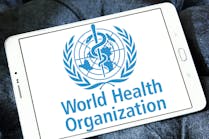Risk of preterm birth, severe COVID-19 in pregnant women
Pregnant women with SARS-CoV-2 infection are at increased risk for severe illness compared with non-pregnant women, according a report published by the Centers for Disease Control and Prevention (CDC).
Adverse pregnancy outcomes such as preterm birth and pregnancy loss have been reported. Among 3,912 infants with known gestational age born to women with SARS-CoV-2 infection, 12.9 percent were preterm (<37 weeks), higher than a national estimate of 10.2 percent. Among 610 (21.3 percent) infants with testing results, 2.6 percent had positive SARS-CoV-2 results, primarily those born to women with infection at delivery.
These findings can inform clinical practice, public health practice, and policy. It is important that providers counsel pregnant women on measures to prevent SARS-CoV-2 infection.
Pregnant women with COVID-19 are at increased risk for severe illness and might be at risk for preterm birth. The full impact of infection with SARS-CoV-2, the virus that causes COVID-19, in pregnancy is unknown.
Public health jurisdictions report information, including pregnancy status, on confirmed and probable COVID-19 cases to CDC through the National Notifiable Diseases Surveillance System. Through the Surveillance for Emerging Threats to Mothers and Babies Network (SET-NET), 16 jurisdictions collected supplementary information on pregnancy and infant outcomes among 5,252 women with laboratory-confirmed SARS-CoV-2 infection reported during March 29–October 14, 2020.
Because the majority of pregnant women with COVID-19 reported thus far experienced infection in the third trimester, ongoing surveillance is needed to assess effects of infections in early pregnancy, as well the longer-term outcomes of exposed infants. These findings can inform neonatal testing recommendations, clinical practice, and public health action and can be used by healthcare providers to counsel pregnant women on the risks of SARS-CoV-2 infection, including preterm births.
SET-NET conducts longitudinal surveillance of pregnant women and their infants to understand the effects of emerging and reemerging threats. Supplementary pregnancy-related information is reported for women with SARS-CoV-2 infection (based on detection of SARS-CoV-2 in a clinical specimen by molecular amplification detection testing) during pregnancy through the day of delivery. As of October 14, 2020, 16 jurisdictions have contributed data. Pregnancy status was ascertained through routine COVID-19 case surveillance or through matching of reported cases with other sources (e.g., vital records, administrative data) to identify or confirm pregnancy status.
Jurisdictions reported 5,252 pregnant women with SARS-CoV-2 infection. Among these women, 309 (5.9 percent) were presumed to have ongoing pregnancies (no outcome reported and not past their estimated due date plus 90 days for reporting lag), and 501 (9.5 percent) did not have pregnancy outcomes reported and were either missing an estimated due date or presumed lost to follow-up. This report focuses on the 4,442 women with known pregnancy outcomes (84.6 percent of 5,252 women).
The median age of women was 28.9 years, and 46.0 percent were Hispanic or Latina (Hispanic) ethnicity. At least one underlying medical condition was reported for 1,564 (45.1 percent) women, with pre-pregnancy obesity (body mass index ≥30 kg/m2) (35.1 percent) being the most commonly reported. Most (84.4 percent) women had infection identified in the third trimester (based on date of first positive test result or symptom onset). Symptom status was known for 2,691 (60.6 percent) women, 376 (14.0 percent) of whom were reported to be asymptomatic.
Eight of the infants with positive test results were born preterm (26–35 weeks); all were admitted to a neonatal ICU (NICU) without indications reported. Among the eight term infants with positive test results, one was admitted to a NICU for fever and receipt of supplemental oxygen, one had no information on NICU admission, and the remaining six were not admitted to a NICU. No neonatal immunoglobulin M or pregnancy-related specimen (e.g., placental tissue or amniotic fluid) testing was reported; thus, routes of transmission (in utero, peripartum, or postnatal) could not be assessed.
These data can help to inform and counsel persons who acquire COVID-19 during pregnancy about potential risk to their pregnancy and infants; however, the risks associated with infection early in pregnancy and long-term infant outcomes remain unclear. SET-NET will continue to follow pregnancies affected by SARS-CoV-2 through completion of pregnancy and infants until age six months to guide clinical and public health practice.
It is important that healthcare providers counsel pregnant women that SARS-CoV-2 infection might increase the risk for preterm birth and that infants born to women with infection identified >14 days before delivery might have a lower risk of having test results positive to SARS-CoV-2. Pregnant women and their household members should follow recommended infection prevention measures, including wearing a mask, social distancing, and frequent handwashing when going out or interacting with others. In addition, pregnant women should continue measures to ensure their general health including staying up to date with annual influenza vaccination and continuing prenatal care appointments.





